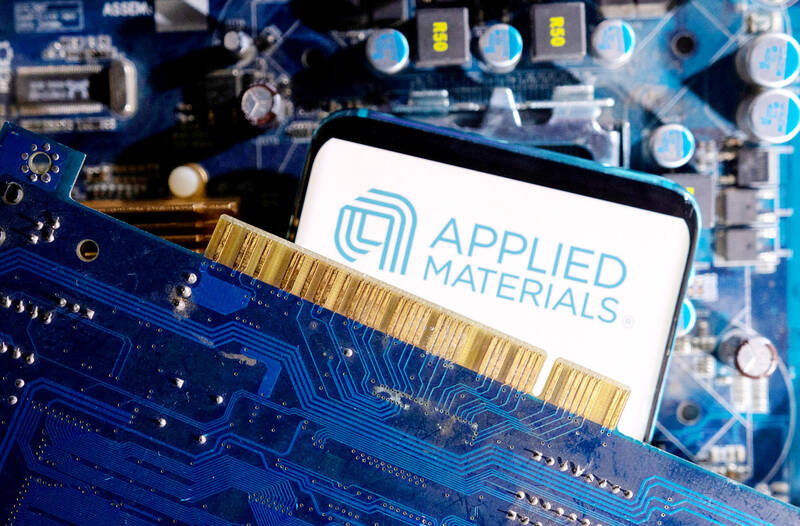Applied Materials Inc, the largest US maker of chip-manufacturing equipment, on Thursday gave a lukewarm revenue forecast for the current period, citing the risk of export controls crimping its business.
Sales would be about US$7.1 billion in the fiscal second quarter, which runs through April, the company said in a statement.
That compares with an average Wall Street estimate of US$7.22 billion.

Photo: Reuters
Profit per shares would be US$2.30, Applied Materials said, in line with projections.
Applied Materials chief financial officer Brice Hill said the company was “taking into account export control related headwinds.”
China makes up about one-third of the company’s sales and stricter trade curbs from the US have made it harder to sell in that nation.
The company’s shares fell about 5 percent in extended trading following the announcement. They had earlier closed at US$184.27, up 13 percent this year.
Export rules adopted in the final months of the administration of former US president Joe Biden would knock about US$400 million off revenue this fiscal year, the company said.
About half of the reduction would come in the current period, with much of it hitting Applied Materials’ service business.
That is because the company would have to stop servicing equipment at some customer sites in China, Applied Materials chief executive officer Gary Dickerson said on a conference call with analysts.
In the long term, Dickerson said he expects the company’s service operations to resume healthy growth.
China accounted for 31 percent of sales last quarter, down from 45 percent a year earlier.
A surge in orders from Chinese memorychip makers has not continued into this year, the company said.
Meanwhile, Applied Materials is enjoying high demand for the most advanced types of equipment needed for artificial intelligence (AI) components, Dickerson said.
That is making up for weaker demand from makers of less complicated chips, he said.
“The biggest driver for the whole industry is AI,” he said.
The amount of silicon going into data centers — facilities that handle much of the AI workload — will soon surpass the level consumed by personal computers and smartphones.
Those have traditionally been the two biggest markets for chipmakers.
First-quarter profit was US$2.38 per share, excluding some items, compared with an estimate of US$2.28. Revenue gained 6.8 percent to US$7.17 billion. Analysts projected US$7.15 billion.
The company is facing tax changes in Singapore, resulting in an expense of US$644 million, or US$0.79 per share during this fiscal year.
Applied Materials’ management has maintained confidence in the overall growth of the industry.
The rapid spread of semiconductors to new products and the AI boom would help maintain demand, Dickerson said.
The sheer complexity of chips has also added pressure on customers to upgrade their equipment, he said.
Customers of Applied Materials include some of the biggest names in the chip industry, including Taiwan Semiconductor Manufacturing Co (台積電), Samsung Electronics Co and Intel Corp. Those manufacturers order gear well ahead of starting production, making Applied Materials’ forecasts a barometer for demand.

SEMICONDUCTORS: The German laser and plasma generator company will expand its local services as its specialized offerings support Taiwan’s semiconductor industries Trumpf SE + Co KG, a global leader in supplying laser technology and plasma generators used in chip production, is expanding its investments in Taiwan in an effort to deeply integrate into the global semiconductor supply chain in the pursuit of growth. The company, headquartered in Ditzingen, Germany, has invested significantly in a newly inaugurated regional technical center for plasma generators in Taoyuan, its latest expansion in Taiwan after being engaged in various industries for more than 25 years. The center, the first of its kind Trumpf built outside Germany, aims to serve customers from Taiwan, Japan, Southeast Asia and South Korea,

Gasoline and diesel prices at domestic fuel stations are to fall NT$0.2 per liter this week, down for a second consecutive week, CPC Corp, Taiwan (台灣中油) and Formosa Petrochemical Corp (台塑石化) announced yesterday. Effective today, gasoline prices at CPC and Formosa stations are to drop to NT$26.4, NT$27.9 and NT$29.9 per liter for 92, 95 and 98-octane unleaded gasoline respectively, the companies said in separate statements. The price of premium diesel is to fall to NT$24.8 per liter at CPC stations and NT$24.6 at Formosa pumps, they said. The price adjustments came even as international crude oil prices rose last week, as traders

Taiwan Semiconductor Manufacturing Co (TSMC, 台積電), which supplies advanced chips to Nvidia Corp and Apple Inc, yesterday reported NT$1.046 trillion (US$33.1 billion) in revenue for last quarter, driven by constantly strong demand for artificial intelligence (AI) chips, falling in the upper end of its forecast. Based on TSMC’s financial guidance, revenue would expand about 22 percent sequentially to the range from US$32.2 billion to US$33.4 billion during the final quarter of 2024, it told investors in October last year. Last year in total, revenue jumped 31.61 percent to NT$3.81 trillion, compared with NT$2.89 trillion generated in the year before, according to

SIZE MATTERS: TSMC started phasing out 8-inch wafer production last year, while Samsung is more aggressively retiring 8-inch capacity, TrendForce said Chipmakers are expected to raise prices of 8-inch wafers by up to 20 percent this year on concern over supply constraints as major contract chipmakers Taiwan Semiconductor Manufacturing Co (TSMC, 台積電) and Samsung Electronics Co gradually retire less advanced wafer capacity, TrendForce Corp (集邦科技) said yesterday. It is the first significant across-the-board price hike since a global semiconductor correction in 2023, the Taipei-based market researcher said in a report. Global 8-inch wafer capacity slid 0.3 percent year-on-year last year, although 8-inch wafer prices still hovered at relatively stable levels throughout the year, TrendForce said. The downward trend is expected to continue this year,